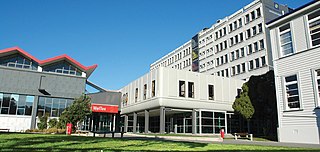Related Research Articles
Further education in the United Kingdom and Ireland is additional education to that received at secondary school that is distinct from the higher education (HE) offered in universities and other academic institutions. It may be at any level in compulsory secondary education, from entry to higher level qualifications such as awards, certificates, diplomas and other vocational, competency-based qualifications through awarding organisations including City and Guilds, Edexcel (BTEC) and OCR. FE colleges may also offer HE qualifications such as HNC, HND, foundation degree or PGCE. The colleges are also a large service provider for apprenticeships where most of the training takes place at the apprentices' workplace, supplemented with day release into college.

Education in England is overseen by the Department for Education. Local government authorities are responsible for implementing policy for public education and state-funded schools at a local level. State-funded schools may be selective grammar schools or non-selective comprehensive schools. All state schools are subject to assessment and inspection by the government department Ofsted. England also has private schools and home education; legally, parents may choose to educate their children by any suitable means.

The Learning and Skills Council (LSC) was a non-departmental public body jointly sponsored by the Department for Business, Innovation and Skills (BIS) and the Department for Children, Schools and Families (DCSF) in England. It closed on 31 March 2010 and was replaced by the Skills Funding Agency and the Young People's Learning Agency.

Kent County Council is a county council that governs the non-metropolitan county of Kent in England. The non-metropolitan county is smaller than the ceremonial county, which additionally includes the unitary authority of Medway. Kent County Council is the upper tier of elected local government, below which are 12 district councils, and around 300 town and parish councils. The county council has 81 elected councillors. It is one of the largest local authorities in England in terms of population served and the largest local authority of its type. The council is based at County Hall in Maidstone. It has been under Conservative majority control since 1997.

In the United Kingdom, regional development agencies (RDAs) were nine non-departmental public bodies established for the purpose of development, primarily economic, of England's Government Office regions between 1998 and 2010. There was one RDA for each of the NUTS level 1 regions of England. Similar activities were carried out in Wales by the Welsh Government Department of Economy and Transport, in Northern Ireland by the Department of Enterprise, Trade and Investment and in Scotland by Scottish Enterprise and Highlands and Islands Enterprise.
A community council is a public representative body in Great Britain.

A NEET, an acronym for "Not in Education, Employment, or Training", is a person who is unemployed and not receiving an education or vocational training. The classification originated in the United Kingdom in the late 1990s, and its use has spread, in varying degrees, to other countries, including Japan, South Korea, China, Serbia, Canada, and the United States. The NEET category includes the unemployed, as well as individuals outside the labour force. It is usually age-bounded to exclude people in old-age retirement.
The Youth Training Scheme (YTS) was the name in the United Kingdom of an on-the-job training course for school leavers aged 16 and 17 and was managed by the Manpower Services Commission. The scheme was first outlined in the 1980 white paper A New Training Initiative: A Programme for Action, and it was brought into operation in 1983 to replace the Youth Opportunities Programme by the government of Margaret Thatcher. Initially lasting one year or six months, the scheme was amended in 1986 to be so that it could be extended to two years.
ELWa was an Assembly Sponsored Public Body responsible for post-16 learning in Wales, active from 2000 to 2006. ELWa's functions are now exercised by the Assembly Government's Department for Children, Education, Lifelong Learning and Skills.
Shaw Trust is a charitable organisation in the United Kingdom which supports people with complex needs into good work. It was founded in the village of Shaw in Wiltshire in 1982.

Community Education, also known as Community-Based Education or Community Learning & Development, or Development Education is an organization's programs to promote learning and social development work with individuals and groups in their communities using a range of formal and informal methods. A common defining feature is that programmes and activities are developed in dialogue with communities and participants. The purpose of community learning and development is to develop the capacity of individuals and groups of all ages through their actions, the capacity of communities, to improve their quality of life. Central to this is their ability to participate in democratic processes.

The Wellington Institute of Technology, also known as WelTec, is a New Zealand polytechnic based in Petone, Lower Hutt. WelTec was formed in 2001 by an amalgamation between the Central Institute of Technology and the Hutt Valley Polytechnic In 2020, WelTec, along with 15 other national polytechnics, became subsidiaries of Te Pūkenga – New Zealand Institute of Skills and Technology.

The Department for Education (DfE) is a ministerial department of the Government of the United Kingdom. It is responsible for child protection, child services, education, apprenticeships, and wider skills in England.
In England, local enterprise partnerships (LEPs) are voluntary partnerships between local authorities and businesses, set up in 2011 by the Department for Business, Innovation and Skills to help determine local economic priorities and lead economic growth and job creation within the local area. They carry out some of the functions previously carried out by the regional development agencies which were abolished in March 2012. In certain areas, funding is received from the UK government via growth deals.

National Citizen Service, also known as the NCS, is a Government-funded personal and social development program in England available for 16-17 year olds. The scheme is run by the NCS Trust, a public body for youth and a key component of the Government's National Youth Guarantee. Since being founded by David Cameron in 2009, NCS has provided around one million away-from-home youth development activities to young people.

The Abbey School is a non-selective secondary school in the town of Faversham in Kent, United Kingdom. Founded with the amalgamation of Ethelbert Road Boys School and Lady Capel School for Girls in 1983, the school consists of 1056 pupils from the ages of 11–19. The school became an academy in August 2011 and joined The Howard Academy Trust on April 1, 2023
The Work Programme (WP) was a UK government welfare-to-work programme introduced in Great Britain in June 2011. It was the flagship welfare-to-work scheme of the 2010–2015 UK coalition government. Under the Work Programme the task of getting the long-term unemployed into work was outsourced to a range of public sector, private sector and third sector organisations. The scheme replaced a range of schemes which existed under previous New Labour governments including Employment Zones, New Deal, Flexible New Deal and the now abolished Future Jobs Fund scheme which aimed to tackle youth unemployment. Despite being the flagship welfare-to-work scheme of the Conservative-led coalition government, and then the incumbent Conservative government from May 2015, the DWP announced, in November 2015, that it was replacing the Work Programme and Work Choice with a new Work and Health Programme for the longer-term unemployed and those with health conditions. The DWP also announced that it would not be renewing Mandatory Work Activity and Help to Work which included Community Work Placements.

Oasis Academy Isle of Sheppey is a coeducational secondary school and sixth form with academy status, located over two sites in Minster-on-Sea on the Isle of Sheppey in the English county of Kent. It is currently managed by the Oasis Community Learning Multi-academy Trust.

Regional economy in Wales is centred on four regional economic boards in Wales. Each board oversees a city or growth deal, signed between 2016 and 2022, lasting 10–15 years. Two of the deals are city deals signed and proposed by their respective economic boards, and their areas are described as "city regions"; the Cardiff Capital Region and Swansea Bay City Region. Whereas in North Wales, the North Wales Economic Ambition Board negotiated a North Wales growth deal signed in 2020, and in Mid Wales, the Growing Mid Wales Partnership, led negotiations for a Mid Wales growth deal signed in 2022. The programmes are based on the City deal and Growth deal initiatives set up by the Coalition UK Government in 2012, to promote the decentralisation of the UK economy, by stimulating local economic growth.
Arfor is an economic support programme of the Welsh Government, partnering with Plaid Cymru, as a joint venture with local councils, in Carmarthenshire, Ceredigion, Gwynedd and the Isle of Anglesey, specifically catered to support the Welsh language. The programme covers large parts of Y Fro Gymraeg, the Welsh-speaking heartlands, in the north-west and west of Wales, and is to support the use of Welsh in its heartlands, therefore the language overall.
References
- ↑ Lourie, Julia (7 May 1997). "Training and Enterprise Councils Research Paper 97/48" (PDF). UK Parliament. Retrieved 2 May 2022.
- ↑ "employee training | business | Britannica". www.britannica.com. Retrieved 2 May 2022.
- ↑ "The joy of TECs – A retrospective personal appraisal of HR in and outside the EU | theHRD". theHRDIRECTOR. 5 March 2020. Retrieved 2 May 2022.
- ↑ Robinson, Graham (1 January 1992). "Training and Enterprise Councils: The Story So Far: A Special Review of Policy Studies 13:1". Industrial and Commercial Training. 24 (9). doi:10.1108/00197859210020231. ISSN 0019-7858.